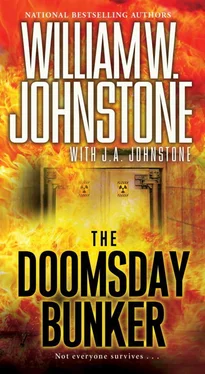Moultrie came in while Larkin was thinking about that, and the talk in the room immediately stopped as everyone turned to look at the project’s founder and leader. Deb was with him, and both of them wore grim expressions.
“Hello, everyone,” Moultrie said as he walked to the head of the table. “Thank you for coming. Please sit down.”
They took chairs. Susan came back to sit next to Larkin. Deb sat at one end of the table, Moultrie at the other.
“I’m sure all of you have a pretty good idea why we’re here,” Moultrie went on. “We need to figure out a plan to deal with the problem facing us. I’ll be honest with you. I considered this possibility when I was putting the project together, but I never believed it to be a real likelihood. All the odds seemed to be that no one in the area would survive a nuclear war except us.”
No one else looked like they were going to say it, so Larkin did. “Those survivors may have come in from somewhere else. From what we know, there are probably large parts of West Texas that are still livable.”
Moultrie leaned back slightly in his chair and said, “It depends on what you mean by livable. There’d be no power because of the EMPs knocking out everything that relies on computers, which is almost everything electronic and mechanical these days. Depending on the winds, the fallout could be dangerous. And twenty-first-century people just aren’t equipped, mentally or physically, to deal with an eighteenth-century existence. I suspect the mortality rates have been extremely high all across Texas during the past eight months.”
He was probably right about that, Larkin thought. But it still didn’t rule out the chance that the survivors moving around up on the surface had come from somewhere else.
But then Larkin had to ask himself if it really mattered one way or the other. He supposed it didn’t. The survivors were there and in bad shape, wherever they came from.
“We’ve had other suspicious readings from the motion sensors in the past few days,” Moultrie went on. “The data is too fragmentary to make even a wild guess about how many survivors there might be. At least a handful.”
“We could easily handle a few more people,” Jessica Kenley said. She had been a pediatrician before the war, although down here there were no real specialists anymore. All the doctors had to treat whatever patients came their way.
“Even if we knew there were only three or four, it would mean opening the project and exposing everyone down here to outside contaminants. I’m not willing to do that yet.”
Bald, dour Dr. Stan Davis spoke up, saying, “We’ve all seen the footage from the stairwell camera. Anyone with that degree of radiation sickness is beyond our help. I agree with Graham that it’s not worth the risk.”
“And we don’t know that there are only three or four of them,” Chuck Fisher said. “There could be hundreds of them, maybe more, staying just out of range of our sensors. There’s no telling what they might be plotting against us up there.”
The mention of plotting struck Larkin as a little paranoid, but unfortunately, none of them had any way of knowing whether Fisher was right.
Or did they? Larkin knew he might be pushing his luck, but he asked bluntly, “Is there any truth to the rumors that you’ve sent surveillance cameras up to the surface, Graham?”
Moultrie didn’t answer immediately, which in a way was an answer in itself. Finally, he said, “We did, but the cameras failed after a short time, possibly due to the high levels of radiation. And I wouldn’t give the okay to open the access tubes so they could be taken out and repaired. But in the time they were operational, we got a look around. There were… no signs of life. If you’ve ever seen an area after a big wildfire went through, that’s the way it looks up there now. All the vegetation was burned off. The hills are bare dirt and rock. And there was no sun. You’ve heard about nuclear winter. That seems to be what the area is experiencing. The clouds of dust and ash still in the sky are causing a state of perpetual dusk. The temperature hadn’t gotten out of the forties, we know that much from our other sensors, even though we don’t have eyes up there anymore. It’s pretty bleak, my friends. No place for humanity.” He paused. “We’re better off down here.”
“No one’s doubting that,” Larkin said.
Fisher said, “The important thing is that we don’t know how much of a threat those people represent, so we have to proceed as if they’re a danger to us. I know you mean well, Dr. Kenley, but we can’t open the doors.”
“Is that what we’re debating here?” she asked.
“It’s not a debate,” Moultrie said. “I’m not going to risk the safety of everyone down here. My humanitarian impulses ended the day they dropped the bomb.”
Susan said, “There are some residents who would say that you calling all the shots makes this a dictatorship, Graham.”
Moultrie smiled. “Do you feel that way, Susan?”
“I didn’t say I did. As a matter of fact, I don’t feel that way. But you know who does.”
“Charlotte Ruskin and her friends.”
“And people like Beth Huddleston and her husband.”
Moultrie arched an eyebrow. “Beth and Jim? Really? I thought they were in agreement with how things have been going.”
Beth would disagree that the sky was blue, just to be disagreeable, Larkin thought. But these days… well, who could say what color the sky really was, with all those clouds of dust and ash blocking the sun?
“We’re losing sight of why we’re here,” Fisher said. “We’re not letting anyone else in, that’s clear enough. But what are we going to do if they try to get in?”
“You mean force their way in?” Larkin asked.
“That’s right. They have to be desperate. There’s no telling what they might do. They busted into the blockhouse, didn’t they?”
One of the engineers said, “I don’t see how they did that. Vehicles won’t run without computers, will they?”
Moultrie smiled. “You’re too young to remember when cars didn’t have computers, Jared, but some of us here aren’t. As long as they’ve got gas to run it and the charge in the battery holds out, an old truck with a carburetor will work just fine. I’m sure that’s what they used to crash into the blockhouse and knock down the door. There may be a lot of other vehicles up there that will still run.”
“That’s not eighteenth-century technology,” Larkin pointed out. “Neither are the weapons they could have.”
“Exactly,” Moultrie said, nodding. “I have trouble believing they could come up with enough explosives to damage the blast door, and they’d have to get through two of them, not just one. But we can’t rule it out, so we have to be ready just in case. We control the ventilation system in the antechamber between the doors. I propose that if there’s ever a breach of the outer door, we pump poison gas into the chamber. In fact, we can flood the whole stairwell with it.”
A tense silence filled the room in response to Moultrie’s suggestion. Susan and Dr. Kenley stared at him in apparent disbelief at what they had just heard, and some of the technical staff looked uneasy, too. Finally, Dr. Kenley said, “Graham, you’re talking about murder.”
From the other end of the table, Deb spoke up for the first time since entering the meeting. She said, “No, he’s talking about self-defense. We’ve already killed to protect the project. Or have you forgotten about some of the things that happened on the day of the war? There’s a good chance that if we hadn’t stopped people from flooding in here, we’d all be dead by now.”
Quietly, Moultrie said, “Deb’s right. I won’t deny that the idea is distasteful, but it’s a matter of survival.”
Читать дальше









